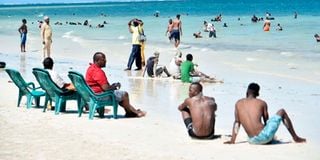Coast sleeping on its potential

Holiday makers at Nyali Public Beach in Mombasa on April 4, 2021.The Court of Appeal has set aside an order compelling the Mombasa County government to pay the beach operators Sh25 million as general damages for violation of their rights following their eviction from the Jomo Kenyatta public beach.
What you need to know:
- The Coast region has a rich, ancient culture and modern links to the Middle East which can be leveraged for trade and investment.
- The Coast has many advantages in commerce as well because of its access and mastery of the sea and its vast resources.
If all Kenyan counties were requested to secede and form their own little independent countries with the governors as the rulers and the county assemblies as parliaments, how many would survive in self-government and how many would become small Somalias and Afghanistans of state collapse and anarchy?
I’m willing to bet that not many would survive — least of all at the Coast, where I have put my ear to the ground for the past two days. By the way, the last time I wrote about the Coast, which is dear to my heart and I used to consider it my home, I got in a lot of trouble. This time I’ll not, because I’ll just comment on the politics.
The Coast has many economic and cultural advantages. First, it has a rich, ancient culture and modern links to the Middle East which can be leveraged for trade and investment. As a matter of fact, many of our Arabs whom I meet are proud to point out their relations to the Mazruis and other ruling dynasties and linkages to Oman and other wealthy places. But they have not sufficiently exploited those links — other than recruiting housegirls (modern-day slaves, in most cases) for their relatives in the Middle East.
A lot more can be done, I believe, to exploit the family ties to the Middle East for the benefit of the Coast, rather than the other way round. The Swahili civilisation is rich in skills — government, trade and commerce, masonry and carpentry, to name but a few — not to mention the gift of language that it has bestowed on a large part of the African mainland.
The Coast has many advantages in commerce as well because of its access and mastery of the sea and its vast resources. Right now, wealthy Coast oligarchs are fighting for the control of the port as the Chinese milk the Indian Ocean of all of its fish. There is more prosperity to be had from the sea, I think.
The Coast also has many disadvantages. The first comes from its advantage — its ancient history and culture, which manifests itself in cleavages of modern-day racism and a subtle caste system where sections of the society are presumed to be racially superior and others inferior. The region, with all its potential, is poor, and not just due to oppression by the government in Nairobi or invading upcountry people: There are contradictions within.
I think the surest way to a prosperous future is for folks to take their eyes off the rear-view mirror and not to glory too much in the heroic past but focus on building an equal, prosperous future within the larger Kenyan and African construct.
Poor leadership
The second problem is poor leadership. This is not to suggest that only the Coast suffers from poor or ineffective leadership. No, this is a national malaise, but the Coast has its fair share of it. And this is not to say that there are no good leaders at the Coast; there are very good leaders in the region.
To my way of thinking, the education initiative by the government of Kwale Governor Salim Mvurya Mkalla is exemplary leadership. Offering bursaries for all children from Grade One to Form Four, as well as support for adult education, is transformational. Does Kwale receive more money than other counties from the national government? No, it just gets its fair share. Is Kwale richer than other counties? Absolutely not; it just has good priorities.
The average literacy in Kwale is 57 per cent, almost 30 percentage points behind the national average. This is the same as saying nearly half of the people of Kwale are, on average, illiterate. Without a basic education, people cannot take advantage of the opportunities in the economy and elsewhere.
Education is not just a matter of government policy. Even the relationship between it and poverty, in my experience, is not a direct one. Educational transformation is anchored in the attitudes of the people; a people who value education will find a way to educate their young.
When the dust settles in 20 years or so, Mr Mvurya will be ranked as one of the most successful and impactful leaders of the devolution age, especially if his programme succeeds in changing the attitudes of the community towards education and a new, educated, skilled, vibrant young population emerges in that county.
Literacy levels in Kilifi are far better than Kwale’s but also way below the national average. Tana River fares worse than all.
The point I am trying to make is that leadership has more to do with stewarding the future than building shiny structures for the current generation, or conspicuous consumption. A county that sees its future as tourism should have tarmacked its entire length of beach roads, provided electricity and water along the beach and implemented policies to encourage investment.
Next year, the Coast will, probably, be the Western Province of the 2022 election — a free-for-all for all parties, especially if ODM loses its grip on the masses. This is the right time for the region to fashion an agenda for its future and pick the leaders with the right skills and attitudes to construct that future.





